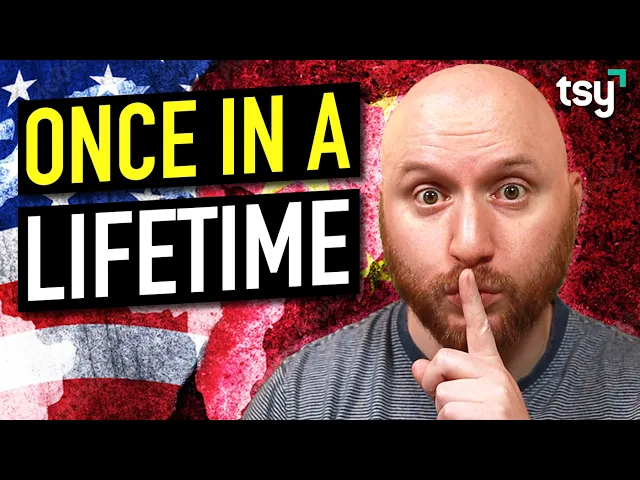Trump’s Tariff Pause Will Make Millionaires in 2025 (Here’s How)

Tariff tensions create unlikely investment opportunities
In a surprising economic twist, Trump's potential return to office and his accompanying tariff policies are creating unexpected opportunities for savvy investors. While tariffs often spark fear in financial markets, there's mounting evidence suggesting targeted investments could capitalize on this policy shift, turning market disruption into strategic advantage.
The recent analysis of Trump's proposed tariff policies paints a nuanced picture far from the doomsday scenarios often portrayed in mainstream financial media. Rather than bracing for across-the-board market decline, informed investors are positioning themselves to ride the coming wave of economic restructuring that will inevitably follow significant tariff implementations.
Key insights from the analysis:
- Trump's proposed tariffs would primarily target China (60%), Mexico (10%), and Canada (10%), creating pronounced impacts on specific sectors while leaving others relatively unaffected or potentially strengthened
- Historical data from Trump's first administration shows tariffs didn't trigger widespread economic catastrophe – instead, they reshaped trade relationships and manufacturing priorities
- The anticipated 10-20% tariffs would initially cause price increases, but likely drive long-term reshoring of manufacturing, creating domestic investment opportunities
The most compelling insight comes from examining how these policies might completely reshape global supply chains. Unlike temporary market disruptions, tariff-driven supply chain restructuring represents a fundamental economic realignment that creates lasting investment opportunities. When companies are forced to rethink their entire production and sourcing strategies, entirely new business ecosystems emerge – and early investors in these shifts stand to capture significant value.
This matters tremendously in our current economic context because global supply chains have become increasingly fragile. The pandemic exposed critical vulnerabilities in just-in-time manufacturing and overseas dependencies. Trump's tariffs, while disruptive, may accelerate an inevitable rebalancing that prioritizes resilience over pure efficiency – a transition already gaining momentum among forward-thinking corporations.
Beyond the obvious: Hidden opportunities in tariff policies
What many analyses miss is how tariffs create asymmetric investment opportunities. While the market broadly reacts negatively to tariff announcements (creating general selling pressure), specific sectors and companies are positioned to thrive. For instance, during Trump's first term, American steel producers saw significant gains despite broader market uncertainty around tariff policies.
Consider the case of Nucor Corporation, America's largest steel producer.
Recent Videos
How To Earn MONEY With Images (No Bullsh*t)
Smart earnings from your image collection In today's digital economy, passive income streams have become increasingly accessible to creators with various skill sets. A recent YouTube video cuts through the hype to explore legitimate ways photographers, designers, and even casual smartphone users can monetize their image collections. The strategies outlined don't rely on unrealistic promises or complicated schemes—instead, they focus on established marketplaces with proven revenue potential for image creators. Key Points Stock photography platforms like Shutterstock, Adobe Stock, and Getty Images remain viable income sources when you understand their specific requirements and optimize your submissions accordingly. Specialized marketplaces focusing...
Oct 3, 2025New SHAPE SHIFTING AI Robot Is Freaking People Out
Liquid robots will change everything In the quiet labs of Carnegie Mellon University, scientists have created something that feels plucked from science fiction—a magnetic slime robot that can transform between liquid and solid states, slipping through tight spaces before reassembling on the other side. This technology, showcased in a recent YouTube video, represents a significant leap beyond traditional robotics into a realm where machines mimic not just animal movements, but their fundamental physical properties. While the internet might be buzzing with dystopian concerns about "shape-shifting terminators," the reality offers far more promising applications that could revolutionize medicine, rescue operations, and...
Oct 3, 2025How To Do Homeless AI Tiktok Trend (Tiktok Homeless AI Tutorial)
AI homeless trend raises ethical concerns In an era where social media trends evolve faster than we can comprehend them, TikTok's "homeless AI" trend has sparked both creative engagement and serious ethical questions. The trend, which involves using AI to transform ordinary photos into images depicting homelessness, has rapidly gained traction across the platform, with creators eagerly jumping on board to showcase their digital transformations. While the technical process is relatively straightforward, the implications of digitally "becoming homeless" for entertainment deserve careful consideration. The video tutorial provides a step-by-step guide on creating these AI-generated images, explaining how users can transform...
